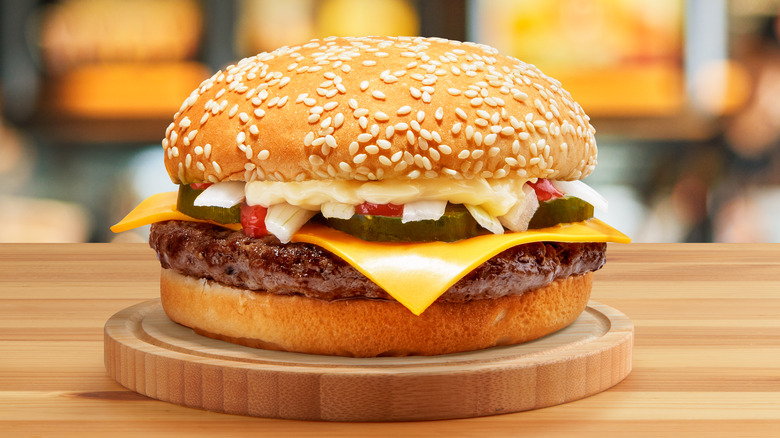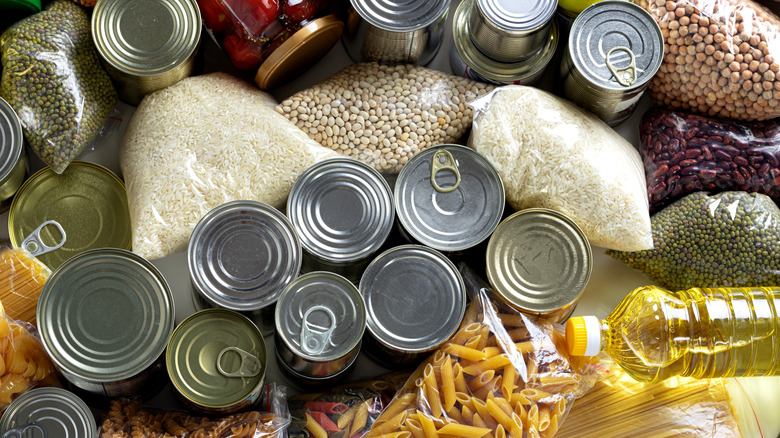How Do Canned Cheeseburgers Actually Work?
Yes, canned cheeseburgers are a real thing. They sound like a gimmick, like some prank shop novelty item you'd get to test that one friend who claims they'll "eat anything!" but believe it or not, the canned burger originally served a practical purpose. Although the history of burgers goes back over a century, the first canned cheeseburger didn't appear until 2008. It was invented by a Swiss company called Trekking-Mahlzeiten (German for "Trekking Meals"), which makes ready-to-eat meals and emergency rations for campers and hikers. Since then, a couple of other companies have also debuted canned burgers, but, unsurprisingly, their popularity has remained rather limited.
It is, indeed, a complete cheeseburger, with bun, patty, cheese, pickles, onions, and condiments, and something about pulling a fully-assembled sandwich out of a can feels like dark magic at work. Of course, the reality isn't so sinister, but canning meat-based items like a cheeseburger does require special technology. The standard methods of canning food at home, water bath canning and steam canning, will not preserve meat because they only work with foods that are naturally acidic enough to kill bacteria. Red meat is low in acid, so it must be canned via pressure canning technology, which allows the contents of the can to be heated above 212 degrees Fahrenheit, the temperature at which water boils. By reaching temperatures of 240 degrees, pressure canning ensures that all harmful bacteria are killed. Unfortunately, it leaves you with a pretty awful burger.
What it's like to eat a canned cheeseburger
Not many people have been brave enough to sample canned cheeseburgers, but the limited reviews show a consensus; they're bad. A team of tasters at The Takeout described canned cheeseburger as, "not quite meat," and "pretty much like a dog-food patty." YouTuber emmymade, who has sampled some questionable canned items, said, "It doesn't taste remotely like a burger ... at all." The most consistent complaints were about the texture of the patty, described as mushy and granular; the bun, which was universally found to be soggy, and the overwhelmingly salty flavor of the burger.
Canned cheeseburgers are meant to be heated by dropping the entire can into a boiling pot. Most directions actually recommend a bain-marie, which is rather ridiculous as that is hardly standard camping gear. The can is going to rattle around a lot as it boils, and your ears will hate it. It's also recommended to remove the label from the can before boiling, or else it will peel off in the water.
From a nutritional standpoint, canned cheeseburgers are calorie-dense, as you'd expect from camping rations. The canned cheeseburger sold by The Adventure Company packs 297 Calories into 100 grams of food. However they are also highly-processed, and the overwhelmingly salty flavor reported by virtually all who've tasted them is reflected by the whopping 1.38 grams of sodium per 100 grams of burger. That's more than half of the Dietary Guidelines for Americans' daily recommended allowance.
What can't you can?
The canned cheeseburger feels like a classic case of "just because you can, doesn't mean you should," and it also begs the question, if you can can a whole cheeseburger, what can't you can? The whole purpose of canning food is to protect it from harmful bacteria, like the kinds that cause botulism and listeria. Bacteria can be killed with either acid or heat, which is why highly acidic foods like fruits can be canned using water baths, but low-acid foods such as meat have to be pressure canned to reach 240 degrees Fahrenheit. Between these methods, you can can just about any food you can think of, with a few exceptions.
Foods that are mainly composed of fats or oils cannot be canned because they do not have enough water present in them to reach the temperatures required to kill most harmful bacteria. This actually raises concerns in the case of canned cheeseburgers because cheese and other dairy products typically contain high levels of fat. There are a lot of canned cheese sauces and soups out there, but there are no formal regulations for safely canning dairy... as if you needed another reason to steer clear of canned cheeseburgers. You can add these to the list of canned foods to avoid in your pantry.


